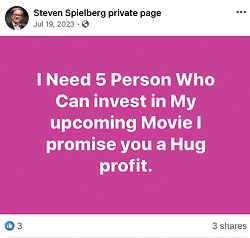|
FEATURE
Alarmed and Alarming: Teaching Patrons How to Spot Celebrity Impostors
by Wesley Johnson

Celebrities often have many impersonators on social media. |

Impostors may ask outright for donations. |

Some appeals by impostors may seem authentic and harmless, but are actually phishing attempts. |

Sometimes, you may even find someone impersonating the dead. (Waylon Jennings died in 2002.) |

Impostors may try to sell you a fan club membership for money. |
‘Johnny Depp,’ writing through his Johnny Depp Real Lovers Page, once asked for my help paying for cardiology school.
A long time ago (the mid-90s), in a big-box retailer far, far away, my father purchased a 25 MHz Packard Bell PC with Windows 3.1 preinstalled. It was our family’s first computer.
America Online was the dominant internet service at the time we made this monumental purchase. The company’s “Free 15 Hours” discs showed up in our mail consistently. Bins full of them were in several stores we frequently visited too. The promise of those “Free 15 Hours” proved difficult for my dad to resist. He subscribed and set my sister and me up with our own accounts. My mom remained offline.
Everything Old Is New Again
Things seemed to be going quite well with the new PC and internet service; however, all was not as it seemed. An email from AOL showed up in my inbox that mentioned there was a billing problem with my account. Since my dad paid the bill, a message like that should’ve gone to his inbox. He reached out to AOL’s tech support after I showed it to him. “Be careful,” he was told, “someone could be trying to steal your login information.” This, as we know today, is called phishing.
That ominous warning piqued my curiosity. The email I’d received featured an AOL logo, text that vaguely described the billing issue, and a link I could click to resolve it. Hovering over the link revealed that it went to a page hosted on AOL Hometown, the free space they offered to subscribers at the time. I decided to click the link. Thankfully, rather than infecting our PC, it simply brought up a page with a login prompt. I used that prompt to send our new friend several bogus logins. Then I was able to find their actual website by editing the link they’d sent. That page featured their email address. I sent them a message to let them know they weren’t getting our login. They replied to that with a winky emoticon.
Email filtering, firewalls, and general tech-savviness have improved dramatically since then. Sadly, though, phishing attempts are still frequently successful. In 2023, according to the FBI’s “Internet Crime Center” report, individuals in the U.S. lost $12.5 billion to internet-based crimes. Research firm Cybersecurity Ventures estimates that worldwide losses will hit $10.5 trillion by 2025. Phishing is only a part of the problem, though.
Oldest Trick in the Book
A patron once approached the information desk at my library and asked for help locating some files on his Android phone. The files were scans of bank forms that he’d signed that needed to be sent to his fiancée. Both clerks working at the desk were unable to find what he needed. They called the IT department for assistance. I took that call, but my efforts were also fruitless. Prior to my arrival, while engaging in small talk with the clerks, the patron mentioned that he’d never met his bride-to-be. The signed forms he was looking for would give her full access to all of his bank accounts. This raised some red flags.
A romance scam, according to an FBI press release (fbi.gov/contact-us/field-offices/detroit/news/press-releases/avoid-becoming-a-victim-to-romance-scams) is “when a criminal adopts a fake online identity to gain a victim’s affection and trust [and] then uses the illusion of a romantic or close relationship to manipulate and/or steal from the victim.” This type of scam is classified by the FTC’s Consumer Sentinel Databook as an impostor scam, which was its top fraud category of the year. It was responsible for 9.12% of the $12.5 billion U.S. consumers lost to internet-based crimes that I mentioned earlier. Keep in mind that these are reported losses. Many of these types of crimes—possibly due to shame—go unreported.
We weren’t certain how to proceed with our patron. Odds were quite high that he’d have suffered a large financial loss if we continued to help him until the forms were located. If we mentioned to him that he was likely being scammed, he’d have probably left in anger then found help elsewhere. One of our managers came up with what we all felt was the best solution at the time. She suggested that he visit his bank for assistance since we were having trouble finding what he needed.
Social Media Exposure
You have probably created a social media profile on multiple platforms. Doing that, for the most part, is pretty simple. That simplicity has made executing swindles like the one our patron found himself involved in quite easy. All a scammer needs to do is save a few photos from a real profile and upload them to a new one with their own information. A few friend requests later, if their profile is enticing enough, their list of potential victims will be quite large.
Impostor scammers present themselves in many different forms. In the past, they’ve posed as IRS agents trying to get victims to pay a late tax bill that doesn’t exist, a long-lost grandchild studying abroad in need of bail money, the Fraternal Order of Police collecting donations, and your favorite celebrity. That last one has fascinated me for the last few years.
Clickhole, a Buzzfeed-esque parody website from The Onion, published a video called “How to Compliment Jeremy Renner on Facebook” several years ago. The clip, in a style reminiscent of a Photoshop tutorial, taught viewers how to do exactly what was mentioned in the title. In the weeks that followed, each time Renner (or his social media manager) posted to his page, the comments were flooded with direct quotes from the video. Lesson well-received, I guess. I’m ashamed to admit that I was one of the many posting those direct quotes. After I got tired of simply posting what others had written, I decided to create my own character to comment as. That character was an overzealous Jeremy Renner fan who posted subpar fan art on Instagram. His name? Wesley Johnson. My creativity definitely has its limits.
The fictional Wesley Johnson went on to have lots of fun interactions with hardcore Jeremy Renner fans. Others seemed to appreciate my good-natured trolling. I enjoyed doing this so much that I began visiting other celebrity pages to engage in similar shenanigans. That’s when I noticed something odd happening in various comment sections. I’ll now explain that oddity to you with a hypothetical example using the titular Garth Brooks.
Enter Garth Brooks
You’re eating dinner with a friend in your favorite restaurant on a Saturday night. While she’s in the bathroom, your phone lights up with a notification. That notification reveals that 25 replies had been made to a comment you left on a post that either Garth Brooks or his social media manager had published on Garth’s official page earlier that day. You visit that post to see the replies and notice that each of them was by someone with a sketchy looking profile that used “Garth Brooks” in their name. Garth Brooks Private Chat, Garth Brooks Fan Chat Box.com, Chris Gaines (Garth Brooks Real), and several others thanked you for being such a great fan and implored you to send them a direct message on Facebook, Telegram, or Google Chat.
On nearly every page I visited, I’d see legitimate comments from fans of the celebrity who owned the page bombarded with replies from profiles pretending to be that celebrity or their manager. Most of those profiles added words such as “verified” or “fan chat” to their names. Some boldly used the celebrity’s name and their picture. Nearly every reply thanked the fan who left the legitimate comment for their support and encouraged them to send the profile a direct message. I decided I should say hello. The conversations that followed were hilarious, strange, enlightening, and sad. I’ll be putting quotes around the names of the celebrity each scammer was impersonating in the examples that follow. I thought, for legal reasons, that it should be mentioned.
‘Celebrity’ Chats
“Johnny Depp,” writing through his Johnny Depp Real Lovers Page, once asked for my help paying for cardiology school. He and I would potentially enter into a romantic relationship after he graduated if I was able to do it. After that, “Dave Grohl” told me that I could join Foo Fighters for $200. “Jeremy Renner,” upon learning that I couldn’t afford his meet-and-greet fee because I had to order my insulin for the month, encouraged me to skip the medication so we could “be together.” Unfortunately, since “Denzel Washington” was unsuccessful in healing my diabetes through the power of prayer, I couldn’t do that. I hope “Jeremy” understood.
The conversations with “Jeremy” and “Denzel” were both humorous; however, as a type 1 diabetic, they were also infuriating. It hurts to think that some poor soul with the disease could find themselves in a conversation like that and end up being influenced to go without a vitally important medication.
A celebrity impostor profile is often updated to appear more legitimate. The scammer who created it seldom tries to sound like the person they’re impersonating. And sometimes they don’t realize their celebrity is dead. “Waylon Jennings” posted the following to Waylon Jennings Private Page on July 4, 2023: “I’m sad that none of my fans talk to me anymore, am I still loved?” He, for those keeping score at home, passed away in 2002. I found a “Jimmy Buffet” page that was still updating after he’d died. I sent a message to it that mentioned I thought he was no longer with us. To it, “Jimmy” replied, “nah ur father died.” Scammers will immediately insult anyone who presents them with information that contradicts their stories.
The death of Johnny Cash in 2003 hit me rather hard. He was one of my favorite musicians and human beings of all time. Last May, as I browsed for new scammers to chat with, I found a Johnny Cash Private Page that was actively being updated. After saying hello, “Johnny” told me that he’d made his private page because fans were “disturbing” him on the official one. He asked that I not tell anyone about the Johnny Cash Private Page, but I felt I should mention it here. Sorry, “Johnny.”
“Johnny Cash” quickly transitioned from small talk to a sales pitch for the “Johnny Cash Fan Club.” Each of the club’s levels of membership had excellent perks. A Regular Membership ($510) would allow me to attend a meet and greet with “Johnny” before one of his shows. The V.I.P. Membership ($715) upgrades the meet and greet to a dinner “before … and after [the] performance.” Going Gold ($820) means that you and “Johnny Cash” will go on a “trip & tour.” With the Platinum Membership ($1,030), “Johnny Cash” will pay your bills for 4 years, and you’ll have a chance to enter into a romantic relationship and/or marriage with him. I’d like to again remind you that the real Johnny Cash has been dead for 21 years.
Membership cards are often posted and chatted about by celebrity impostor scammers. In August 2023, Alan Jackson Private Page told me about a mysterious group of celebrities who offered these cards to “true fans.” “We are 29 in number,” he wrote, “but I cannot disclose the other names to you yet.” He went on to say that I’d have to earn his trust before I could “rush to pay.” In that, I failed; however, I did succeed in finding out that Kid Rock Private Page, Johnny Depp Private Page, and Verified Lovely Miley Cyrus were each one of the mysterious 29.
Little Recourse
A 71-year-old grandmother who claimed to be engaged to musician Post Malone once appeared on Dr. Phil. She’d been sending Faux Malone lots of money to prove to his family that she wasn’t interested in him because he was rich. In January, my hometown paper, the Messenger-Inquirer, ran an article about someone in the area who’d sent money to someone pretending to be NBC journalist Jacob Soboroff. In Ohio, just a few weeks prior to writing this, news broke that an individual was scammed out of several thousand dollars by a Steve Perry impostor. These are just a few of the many stories of real people falling for these scams.
I’ve reported numerous impostor profiles to various social media platforms; sadly, most of those reports are rejected. You’d think it would be obvious to a support team that “Morgan freeman privacy” wasn’t actually Morgan Freeman. That said, a scammer typically has dozens of profiles at their disposal. Deleting one of those probably won’t help much in the grand scheme of things (pun intended). A better system of verification needs to be adopted on these sites to fight against these scams.
It’s nigh impossible to prevent someone from being scammed on a computer network. That’s because these scammers use legitimate websites to approach their victim. The only way your firewall will help is if you use it to block all social media. Email filters, as mentioned earlier, have greatly improved over the past few years. They will significantly reduce the number of phishing attacks that reach an inbox, but, occasionally, one will slip through. The person who is communicating with the impostor or phisher is the one who has the final say in their trustworthiness.
Scam Spotting
So, what can libraries do to help their patrons avoid these scams? The answer to that question, in my opinion, is to educate them. But start with the staff. Everyone who works in a public library computer lab should be highly trained in the art of scam-spotting. Once they become fluent, they should impart that wisdom to patrons through one-on-one interactions and programs. The topic of scams is incredibly intriguing to people of all ages, so a program that discusses it would undoubtedly go over well.
|